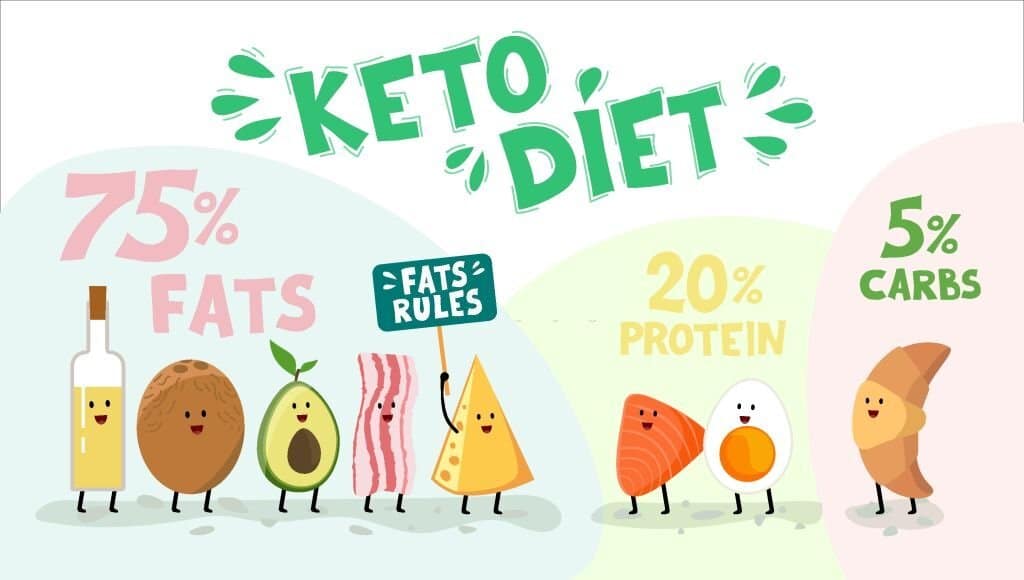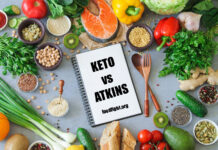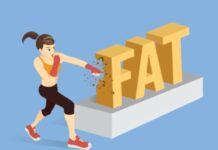The ketogenic diet is an extremely effective tool for tackling obesity, diabetes, and its common causes. That’s why it has grown to be one of the most popular diets today.
We will provide you with excellent resources in PDFs and videos here that you can download for free.
But if you want to know about the fundamentals, we will discuss the basics of what the ketogenic diet is, why it works, and its benefits in this article. Then we will talk about foods you can eat and foods you should avoid on a keto diet.
What is the Ketogenic Diet?
The ketogenic diet is a high-fat, low-carb diet that can help you lose weight and increase energy levels. It’s referred to as “keto” for short.
The keto diet is one of the best ways to lose weight and reduce the risk of health problems like diabetes, heart disease, metabolic syndrome, and more.
With the ketogenic diet, you’re changing the energy source for your body. You’re going off the glucose (or sugar) that comes from carbohydrates; you’re entering a state called “ketosis,” where your body provides most of your energy from breaking down fats.
Why Does the Ketogenic Diet Work?
The ketogenic diet is a low-carb diet. Low-carb diets have been shown to increase weight loss and reduce risk factors for diabetes and metabolic diseases such as heart disease and stroke.
A ketogenic diet is a diet, where less than 10% of your daily calories come from carbohydrates.
You can also think of a ketogenic diet as a high-fat diet. When you eat fewer carbohydrates, your body becomes less efficient at using glucose (sugar) as its primary fuel source.
To compensate, your body burns fat and produces ketones. These are by-products of the breakdown of fat into fatty acids. You want to push your body into producing ketones on the ketogenic diet.
Advantages of Going on a Keto Diet
There are many advantages to going on a ketogenic diet. Here are just a few of them:
- Improved energy levels: The keto diet is known to enhance energy levels. This happens because you’re eating healthy fats, which are known to keep you full longer and give you more energy.
- Weight loss: A keto diet is an excellent tool for weight loss, as it can help you reduce your body fat by 10-15%.
- Better mood and focus: Going on a keto diet can improve your mood and cognition.
- Lower blood pressure: Studies have shown that the keto diet can reduce blood pressure in people with metabolic syndrome.
- Lower cholesterol: Research has shown that following a ketogenic diet can reduce your LDL (bad) cholesterol levels and increase your HDL (good) cholesterol levels.
- Increased physical performance and recovery: Going on a ketogenic diet has been shown to improve physical performance in high-intensity sports like CrossFit and basketball.
- Improved athletic performance: The keto diet can be excellent for athletes because it helps the body use fat as a fuel source instead of carbohydrates.
- Reduced risk of chronic diseases: A ketogenic diet can help reduce your risk of chronic diseases like diabetes, heart disease, stroke, and certain types of cancers.
Disadvantages of Going on a Keto Diet
As with any diet, there are also a few disadvantages to going on a ketogenic diet. Here are a few things to keep in mind:
- Increased hunger: One of the most common complaints about the ketogenic diet is increased hunger. This happens because the body is still adjusting to the change in diet and the reduced amount of carbohydrates.
- Low fiber intake: The keto diet is very low in dietary fiber. This can cause constipation and other digestive problems.
- Vitamin and mineral deficiencies: Another potential disadvantage is that the keto diet isn’t an excellent source of vitamins and minerals. You might be low in calcium and magnesium, for example.
- Reduced insulin sensitivity: Research has shown that the keto diet can reduce insulin sensitivity. This is a major risk factor for type 2 diabetes.
- Low energy in some people: Going on a ketogenic diet can cause some people to feel tired and have reduced energy levels. This is normal and will go away after a few weeks as your body adapts.
How to Start a Keto Diet?
As you can see, the ketogenic diet has a lot of benefits. It’s also very simple to start. All you have to do is:
- Eat more fat: Since fats are very low in carbs and calories, you can eat as much fat as you want.
- Eat fewer carbohydrates: On the keto diet, you have to reduce your carbohydrate intake. This means eating fewer grains, legumes, root vegetables, and fruits.
- Eat more protein: You must eat enough protein to prevent muscle loss.
- Drink plenty of water: To stay hydrated, make sure to drink plenty of water.
Foods to Eat While on A Keto Diet
Here are some foods that you can eat while on a ketogenic diet.
- Fatty fish: Fatty fish like salmon, tuna, sardines, and mackerel are excellent protein sources and healthy fats.
- Nuts and seeds: Nuts and seeds are a great source of healthy fats and protein. Make sure to choose raw varieties.
- Coconut and coconut oil: Coconut is a great source of healthy fats. It’s also an excellent source of fiber, iron, and magnesium. Coconut oil is also an excellent source of healthy fats.
- Meat and poultry: Meat and poultry are excellent sources of protein. Try to choose grass-fed varieties.
Foods to Avoid While on A Keto Diet
Going on a ketogenic diet means eating different foods. Here is a list of foods that you should avoid while on a ketogenic diet:
- Grains: Wheat, oats, and corn are high in carbohydrates and should be avoided on a keto diet.
- Root vegetables and tubers: Potatoes, yams, yucca, and other root vegetables are high in carbohydrates and should be avoided on a keto diet.
- Sugars: Honey, agave nectar, coconut sugar, and other sweeteners should be avoided on a keto diet.
- Fruits: Fruits are high in carbohydrates and should be avoided on a keto diet.
- Legumes: Beans and lentils are high in carbohydrates and should be avoided on a keto diet.
- Some dairy products: These products can be high in carbohydrates and should be avoided on a keto diet. Make sure to check the nutrition labels.
Conclusion
The ketogenic diet is a very effective way of losing weight and reducing your risk of various health problems.
It’s also an effortless diet to follow. All you have to do is eat more fat, reduce your carbohydrate intake and make sure to drink plenty of water.
That’s a very easy task, right?
Now you know everything you need to know about the ketogenic diet and how it works. Try it out and see how it works for you.






